The US has imposed sanctions on Turkish ministries and senior government officials in response to the country’s military offensive in northern Syria.
President Donald Trump also phoned his Turkish counterpart Recep Tayyip Erdogan to demand an immediate truce, Vice-President Mike Pence said.
Mr Pence said he would travel to the region “as quickly as possible”.
The move comes after criticism of a US troop withdrawal from the region which some say gave Turkey a “green light”.
The Turkish offensive, which began last week, aims to push the Kurdish-led Syrian Democratic Forces (SDF) from the border region. Turkey considers the biggest militia in the SDF a terrorist organisation.
The Turkish government wants to create a “safe zone” in the area, where it can resettle up to two million Syrian refugees currently in Turkey.
Many of them are not Kurds and critics warn this could lead to ethnic cleansing of the local Kurdish population.
Dozens of civilians have been killed in the operation so far and at least 160,000 have fled the area, according to the UN.
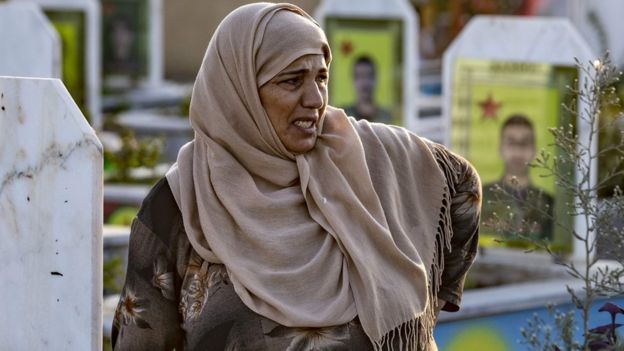
Some aid organisations have been forced to suspend operations and evacuate international staff over security fears.
Kurdish-led forces have been a key ally of the US in the fight against the Islamic State (IS) group in Syria. They described the US withdrawal, which preceded Turkish action, as a “stab in the back”.
There are fears the destabilisation could risk a resurgence of IS, as thousands of former fighters and their relatives are being detained in northern Syria. Hundreds of IS family members are said to have already escaped from one camp.
Facing immense pressure, Kurdish-led forces on Sunday announced a deal with the Syrian government for military support to help repel Turkey.
What are the US sanctions?
US Treasury Secretary Steven Mnuchin announced the measures alongside Vice-President Pence in Washington DC on Monday evening.
Action was taken against Turkey’s defence and energy ministries, as well as the ministers of defence, energy and interior, the US Treasury said. The move freezes their assets in the US and bans transactions with them that involve the US financial system.
“The Turkish government’s actions are endangering innocent civilians, and destabilizing the region, including undermining the campaign to defeat ISIS [Islamic State],” the statement added.
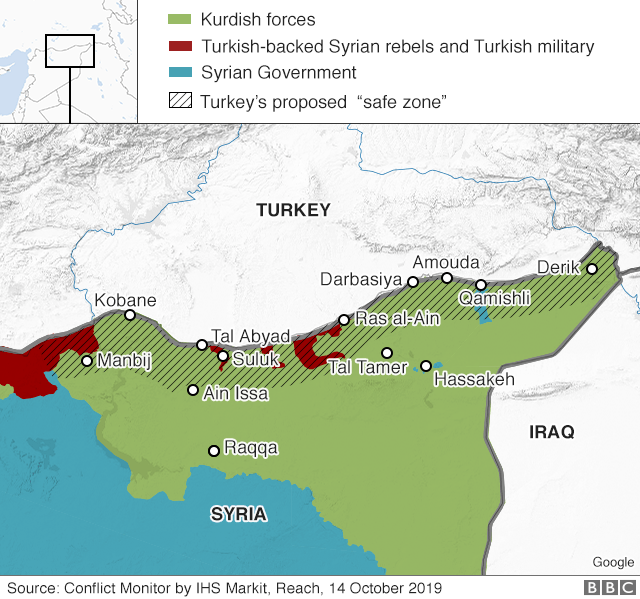

President Donald Trump has faced mounting pressure to take action against Turkey – a Nato partner – including from Republicans usually loyal to his administration.
In a statement posted on Twitter, President Trump also said he would raise tariffs on Turkish steel back to 50% and “immediately stop” negotiations related to a “$100 billion trade deal” with Turkey.
“The United States and our partners have liberated 100 percent of ISIS’s ruthless territorial caliphate,” the statement said. “Turkey must not put these gains in jeopardy.”
Vice-President Pence warned that the sanctions would worsen “unless and until Turkey embraces an immediate ceasefire” and negotiates a long-term settlement on the border.
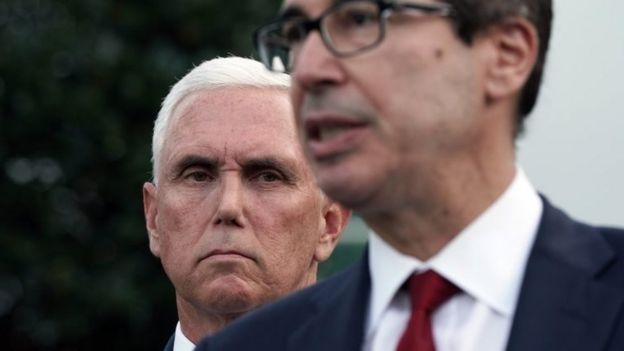
Earlier on Monday, European Union countries committed to suspending arms exports to Turkey but stopped short of an EU-wide arms embargo. In response, Turkey said it would examine its co-operation with the EU due to its “unlawful and biased” attitude.

Lighter than expected
Analysis by Mark Lowen, former BBC Turkey correspondent
Donald Trump is now sanctioning Turkey for an invasion that he is widely considered to have enabled. By announcing a withdrawal of US troops from northern Syria, President Erdogan was given a de facto green light to move in.
The sanctions might appear hefty, targeting senior ministers and hiking steel tariffs. But in reality, they are lighter than expected – and we have been here before.
In August 2018, Donald Trump lost patience with Turkey’s imprisonment of an American pastor, sanctioning two ministers and imposing 50% tariffs on Turkish aluminium and steel. The Turkish lira plunged to a record low of 7.2 to the dollar.
Since then, the lira has somewhat recovered – and appears to have largely shaken off today’s measures. The US represents just 5% of Turkey’s steel export market.
President Erdogan tends to dig in his heels when he feels under pressure. There is no sign of any change of tack by him – yet.

What is happening in Syria?
Following the deal with Kurdish-led forces, the Syrian army began to move towards the border on Monday.
Syrian state media said government forces had entered the strategic town of Manbij, inside the area where Turkey wants to create its “safe zone”. Turkish troops and pro-Turkish, anti-government fighters were gathering near the town.
The deal was seen as a boost for Syrian President Bashar al-Assad as it meant his troops would return to north-eastern areas for the first time since 2012, when their withdrawal to fight rebels elsewhere allowed Kurdish militias to take control.
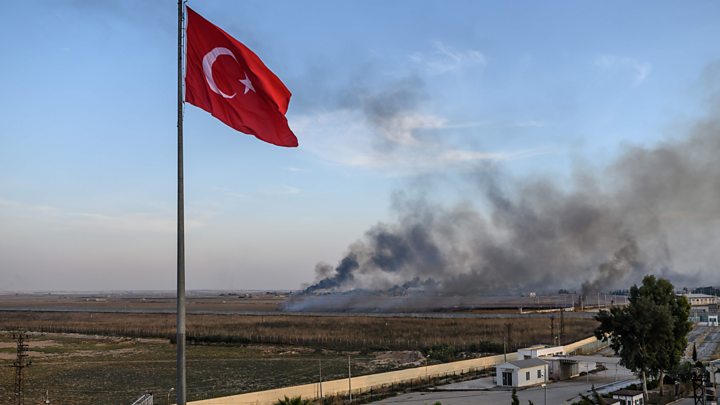
Despite disagreeing with their attempts at self-rule, Mr Assad did not seek to retake the territory, especially after the Kurds became partners in the coalition against IS with US troops on the ground.
Apart from fighting IS, the Kurds were fundamental to the US in limiting the influence of rivals Russia and Iran and keeping some leverage on the ground.
For now, Syrian forces will not be deployed between Tal Abyad and Ras al-Ain, where Turkey has focused its efforts.
The Russian government, a key Syrian ally, said it did not want to entertain the possibility of a clash between Russian and Turkish forces in Syria, and said it was in regular contact with Turkey’s authorities.
President Erdogan insists the operation will continue until Turkey’s “objectives have been achieved” despite the involvement of Syrian government forces.
“God willing, we will quickly secure the region stretching from Manbij to our border with Iraq and ensure that, in the first stage, one million, and then two million Syrian refugees return to their homes on their own free will,” he said in a televised speech on Tuesday.
The United Nations say 160,000 have fled their homes but the Syrian Observatory for Human Rights (SOHR) say this number could be as high as 250,000 with 70 civilian deaths reported.
The UK-based monitoring group say 135 members of the SDF have died in the military operation so far along with 122 pro-Turkish fighters and eight Turkish soldiers.
Turkey’s Anadolu news agency report 18 civilians have been killed over the border in southern Turkey.
On Tuesday the UN Human Rights office called on Turkey to investigate suspected war crimes being carried out by pro-Turkish forces.
“Turkey could be deemed as a state responsible for violations by their affiliated groups as long as Turkey exercises effective control of these groups or the operations in the course of which those violations occurred,” spokesman Rupert Colville said.
The warning came after footage emerged over the weekend that appeared to show summary executions of Kurds, including female politician Hevrin Khalaf.
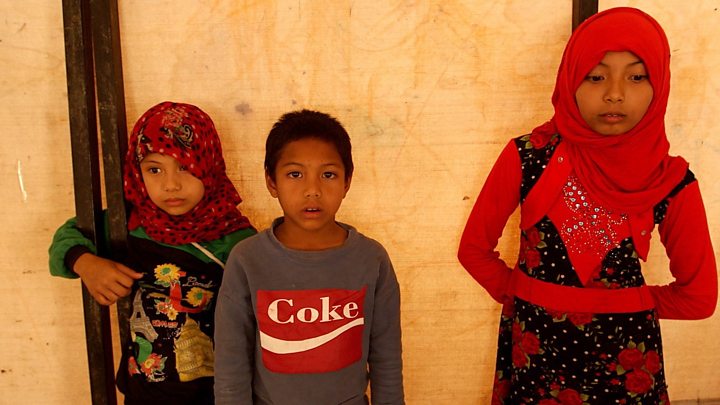
Credit: Source Link